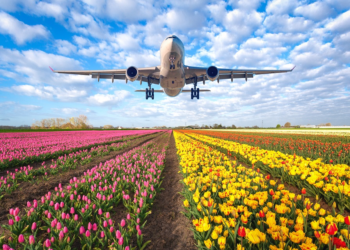Airlines to lose $48B despite banner year for cargo
Airlines will rake in record-high cargo revenues in 2021 on double-digit growth in shipping demand, but lose $47.7 billion because of weak air travel as most countries struggle with controlling virus variants and vaccinating populations, the International Air Transport Association said Wednesday.
The trade group downgraded its outlook from December, when it projected a $38 billion loss, with the net profit margin falling to minus 10.4% from minus 7.1%. And the industry’s return to breakeven operations will be delayed until next year rather than being achieved in the fourth quarter.
The revised forecast represents a big improvement from the $126.4 billion lost last year, but is cold comfort for airlines that need positive cash flow to survive the COVID crisis. The sector is expected to burn $81 billion in cash on top of the $149 billion in negative cash flow last year.
The financial situation would be worse without the cargo side of the business, which normally provides limited ancillary revenue, exceeding its regular performance.
Air cargo is booming, aided by a strong recovery in the global economy and manufacturing exports, and heavy inventory restocking. It recovered to pre-crisis levels earlier this year, and throughput is now expected to increase 13.1% over 2020. IATA estimates total cargo volumes will reach 63.1 million tons in 2021, just below the pre-crisis peak of 63.5 million tons that occurred in 2018.
Through February, air cargo volumes were already up 9% from the corresponding two months in 2019.
The high demand combined with the removal of significant widebody passenger capacity on international routes will drive up yields an additional 5% this year, on top of the 40% gain in 2020, enabling all-cargo and passenger airlines to rake in $152 billion, a historic high. Airlines generated $128 billion in cargo revenue last year and $101 billion in 2019.

In 2021, cargo will account for a third of industry revenue, significantly greater than cargo’s traditional contribution of about 10 to 15% of total revenues, IATA said.
United Airlines and Delta Air Lines are representative of airlines for which cargo has become increasingly important. United’s cargo revenue soared 74% in the first quarter to $497 million, accounting for 15.5% of total revenue compared to about 3% in the past. Delta’s cargo revenue grew 23% in the March quarter, for a 6% share of total revenue versus less than 2% in 2019.
Cargo volumes declined 9.1% last year, but most of that was due to a three-month period when the global economy locked down to prevent the spread of COVID-19. The rest of the year was extremely strong for the airfreight sector.
Passenger woes hinder cargo
The improvement in cargo, however, won’t offset the dramatic decline in passenger revenues.
IATA estimates that travel, measured in revenue passenger kilometers, will recover to 43% of 2019 levels, down from its February projection of demand at 50%. That is a 26% improvement from 2020 but nowhere near what airlines need to survive. Overall, passenger numbers are expected to reach 2.4 billion in 2021 compared to the 2019 peak of 4.5 billion.

Large domestic markets unhindered by COVID-related border restrictions — such as the U.S., China and Russia — are improving much faster than international ones. International passenger traffic is only 13% of its pre-crisis level, but as vaccinations increase in developed countries, that is expected to improve to 34% by year’s end. IATA forecasts domestic markets could recover to 96% of 2019 levels in the second half of the year, a 48% improvement from 2020 totals.
North American airlines are expected to do better than previously forecast with a cumulative loss of $5 billion versus $11 billion. But the situation in Europe is worse, with $22 billion in projected losses compared to $12 billion in the prior report because of slower vaccinations and new outbreaks.

The diminished level of international flying with large jets has resulted in a 15% overall shortage of cargo capacity, which is straining supply chains and driving up rates. Cargo airlines have added 30% more capacity of their own by operating more pure freighters and running them at higher utilization rates, but it isn’t enough to make up for the lost belly space in such a high-demand environment.
IATA said airline industry revenues are expected to reach $458 billion, up 23% from last year but only 55% of the $838 billion generated in 2019. Passenger revenues will total $231 billion compared to $607 billion in 2019.
“This crisis is longer and deeper than anyone could have expected. … Government-imposed travel restrictions, however, continue to dampen the strong underlying demand for international travel,” IATA Director General Willie Walsh said.

The financial recovery of airlines is heavily correlated to immunizations and the spread of the virus because the broader global economy and business confidence has recovered. Some economists project global Gross Domestic Project of about 5.5% to 5%.
IATA’s top priorities include convincing governments to develop plans for restarting wide-scale air travel once infection rates subside, provide more employment support, prevent airport operators from raising fees to recoup their own losses, and hold the line on aviation taxes.
“Everyone must be aligned in understanding that increased travel costs will mean a slower economic recovery. Cost reduction efforts on all sides are needed,” Walsh insisted.
“Most governments have not yet provided clear indications of the benchmarks that they will use to safely give people back their travel freedom. In the meantime, a significant portion of the $3.5 trillion in GDP and 88 million jobs supported by aviation are at risk,” he added. “Effectively restarting aviation will energize the travel and tourism sectors and the wider economy. With the virus becoming endemic, learning to safely live, work and travel with it is critical. That means governments must turn their focus to risk management to protect livelihoods as well as lives.”
Airlines have relied on government aid, stock issues, and heavy borrowing to maintain cash balances and continue operating, but IATA warned that smaller carriers remain vulnerable to bankruptcy because they have not had the same access to relief funds and capital. The industry’s debt burden has increased by $220 billion in the past year to $651 billion, which will make it difficult for companies to expand service when people start flying in large numbers again.

$220 billion rise in airline debt as a result of government aid, market issues. (Souce: IATA, Airfinance Journal)
Resumption of international travel, which accounts for about two-thirds of airline revenues, is critical to stop the cash drain and allow deleveraging to begin, industry analysts say.
The climb to break-even levels will be made more difficult by rising jet fuel and airport expenses. IATA estimates jet fuel will average $69 per barrel, close to the 2019 average of $77 per barrel. Jet fuel is already adding to the high cost of air cargo as airlines pass on the extra expense in the form of fuel surcharges. Non-fuel costs rose by 17.5% in 2020 despite massive cost-cutting as fixed costs were spread over much fewer flights. As capacity increases, IATA says unit costs will decline 15%.
The trade association said capacity is likely to return at a slower pace than demand, as airlines take a cautious approach toward maintaining liquidity given their debt and fuel prices. Taking cargo and passenger traffic into account, the overall weighted load factor is forecast to rise slightly to 60.3% in 2021, considerably below the 66% estimated to break even in 2021 — even though cash costs of operations are being covered.





